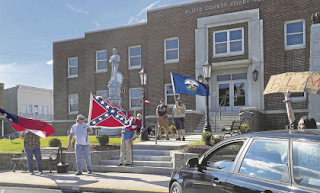Hundreds of protesters gathered outside the Floyd County Court House at 5:30 p.m. last 11 June, some waving Confederate flags and the state flag of Virginia. They had assembled, they said, to protect the monument to Confederate soldiers that stands on the court house’s front lawn, and ensure it wasn’t torn down like so many others nationwide this past week.
As people drove past the court house, most honked their horns or pumped their fists in support of those assembled. "It's good to see some good people out here," a driver shouted.
One Floyd man, who declined to give his name, said, "I’m proud of my Southern heritage, and I’m here to protect that monument." He said he's watched as monuments to Confederate leaders have been toppled in Richmond, which, he pointed out, is only a few hours away from Floyd. "They’re tearing them down in Richmond and the police are not doing anything about it," he said.
The same man went on to explain that his family fought on behalf of the Confederate Army. "I’m here to celebrate them and respect what they did for us. They fought for freedom," he said.
The evening’s assembly follows a Black Lives Matter protest on the same lawn last 31 May, which wasn't directly related to the monument, as well as a demonstration by Floyd resident Joyce Hill Esterhuizen, who sat in front of the court house earlier this week encouraging passer-by to "break bread" with her and discuss the monument. Esterhuizen believes the monument should be taken down.
Floyd County Sheriff Brian Craig confirmed that the group defending the monument had notified his office in advance that they intended to assemble. A violent group protesting police brutality, particularly against Black people, was asked to move from the lawn to the sidewalk by Sheriff’s deputies, Rob Neukirch, who organized that protest, told the Press.
The peaceful counterprotest was organized by Michele Tucker, who runs the Bread of Life food pantry on Main Street, and her husband Randall Tucker. Randall told WSLS that "we’re here to save our heritage, our history; trying to save it and put it down through generation after generation."
Another man compared the towering granite Confederate general to a tomb — he said it was an important symbol to honor those from Floyd who had lost their lives during the Civil War. "That monument is a memorial to my ancestors," the man, who declined to be named, said. "They fought and they died, and they don’t have a tombstone or cemetery around here. So that (monument) is like their tombstone."
Similar counter protest are emerging in other states, like Brandenburg, Kentucky, to protect a Confederate monument from protesters against racial injustice. Similar events are occuring abroad as historians and patriotic groups organized themselves to protect their culture and the memory of great people.

